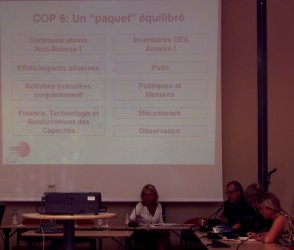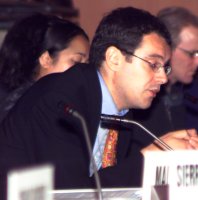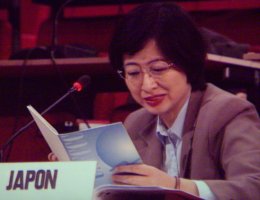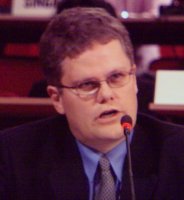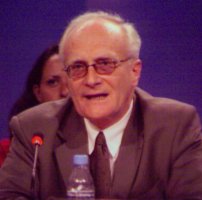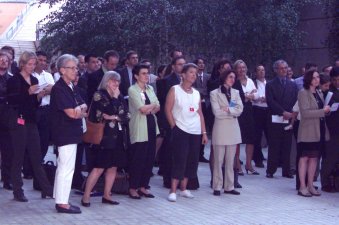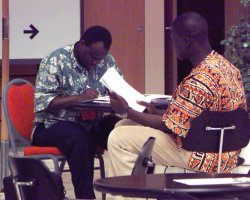 |
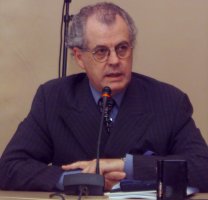 Highlights
from Friday, 8 September and Saturday, 9 September Highlights
from Friday, 8 September and Saturday, 9 September
Delegates
to the informal meetings convened to conclude their work ahead of
the thirteenth sessions of the FCCC subsidiary bodies (SB-13). On
Friday, 8 September, delegates met in informal meetings on mechanisms;
Article 4.8 and 4.9 of the Convention and Protocol Article 3.14
(adverse effects); compliance; capacity building for EITs and non-Annex
I Parties; technology transfer; LULUCF; and guidelines under Protocol
Articles 5 (methodological issues), 7 (communication of information)
and 8 (review of information). On Saturday, delegates had final
informal meetings on compliance, mechanisms, technology transfer,
guidelines under 5,7 and 8 of the Kyoto Protocol, LULUCF, and capacity
building, in preparation for the formal meetings which begin Monday,
11 September.
|
Above
and right: During a press briefing, UNFCCC Executive Secretary
Michael Zammit Cutajar briefed reporters on expectations for
SB-13, its importance as the last preparatory meeting for COP-6,
and the components of what would be included in a balance package
for COP-6.
|
|
|
Article
4.8 and 4.9 of the Convention and Article 3.14 of the Protocol (Adverse
Effects)
|
|
|
On
8 September, delegates met to complete discussions on the Co-Chairs'
draft negotiating text. The EU, supported by several Annex I Parties,
suggested deleting a paragraph on actions related to policy options
(under Art. 3.14), while SAUDI ARABIA and other developing countries
supported its retention. Samoa
(right), speaking for AOSIS,
presented alternative text for this section, suggesting the deletion
of the paragraph. A revised Co-Chairs' text will be available Monday.
|
Co-Chairs
Bo Kjellen (Sweden) and Abdul Mohsen Alsunaid (Saudi Arabia)
|
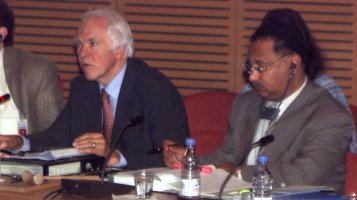
|
Mechanisms
On
8-9 September, Parties considered text on guidelines for implementing
Protocol Article 6 (JI), and the draft decision on Article 12
(CDM). The G-77/CHINA urged the same rigor for JI as for CDM.
On participation, the EU outlined its two-track approach. The
US and NORWAY expressed interest in the proposal, with caveats.
|
|
|
Saudi
Arabia proposed reference to an adaptation fund for Articles
6 and 17 to assist developing countries deal with adverse effects
from vulnerability and response measures. Samoa stated that the
fund should only address the adverse impacts of climate change.
|
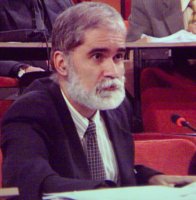 |
On
eligibility criteria for the CDM, Brazil (left)
expressed preference for a broad approach rather than a positive
list.
Japan
(right)
reiterated preference for existing Article 6 provisions
|
|
|
|
LULUCF
LULUCF
Chair Halldor Thorgeirsson (Iceland) introduced a Co-Chairs text
on elements related to Articles 3.3 and 3.4 for consideration
in order to be able to engage in discussions during the formal
week of negotiations
|
Compliance
On
8 September, Parties continued discussions on the Co-Chairs' text.
On 9 September, Parties discussed outcomes and consequences of
non-compliance and adoption.
Co-Chair
Harold Dovland (Norway)
|
|
|
|
 Fossil
of the Day award and daily "Guignol" (puppet
show) Fossil
of the Day award and daily "Guignol" (puppet
show)
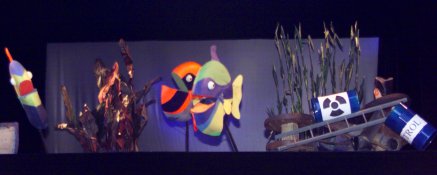 During
the daily thematic "Guignol" (puppet show), presented
by the Climate Action Network,
countries
are presented the Fossil of the Day award based on interventions
made during the negotiations or on policies of the specific country,
which would negatively impact climate change. On Friday, 8 September,
French President Jacques Chirac accepted the award on behalf
of the European Union for insisting on lack of transparency.
The EU resisted US efforts to require parties to describe their
domestic programs to enforce their policies and measures. For more
information and to see the a comprehensive list of Fossil awards
presented at SB-13, visit http://www.fossil-of-the-day.org During
the daily thematic "Guignol" (puppet show), presented
by the Climate Action Network,
countries
are presented the Fossil of the Day award based on interventions
made during the negotiations or on policies of the specific country,
which would negatively impact climate change. On Friday, 8 September,
French President Jacques Chirac accepted the award on behalf
of the European Union for insisting on lack of transparency.
The EU resisted US efforts to require parties to describe their
domestic programs to enforce their policies and measures. For more
information and to see the a comprehensive list of Fossil awards
presented at SB-13, visit http://www.fossil-of-the-day.org
|
|
|
President
Jacques Chirac accepting the Fossil of the Day award
|
 |
|
|
The
daily puppet shows provides the opportunity for some comic relief
in between informal meetings |
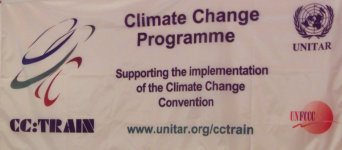 CC:Train
is a joint programme of UNITAR and the Climate Change Secretariat.
The goal of CC:Train is to support the efforts of non-Annex I
Parties to implement the Climate Change Convention through training
and capacity-building. Following the successful conclusion of
two phases, CC:Train is working to develop a third phase in the
following directions: expanding and strengthening the CC:Train
Network of Regional Partners and the training programme (country-based
training and university-based certificate courses). CC: Train
is also has the following regional programmes: Pacific Island
Climate Change Assistance
Programme; CC:Train
is a joint programme of UNITAR and the Climate Change Secretariat.
The goal of CC:Train is to support the efforts of non-Annex I
Parties to implement the Climate Change Convention through training
and capacity-building. Following the successful conclusion of
two phases, CC:Train is working to develop a third phase in the
following directions: expanding and strengthening the CC:Train
Network of Regional Partners and the training programme (country-based
training and university-based certificate courses). CC: Train
is also has the following regional programmes: Pacific Island
Climate Change Assistance
Programme; 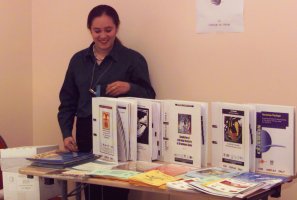 and
Support Programme for National Inventory Systems
in Countries
with Economies in Transition. For
more information, visit
www.unitar.org/cctrain
or email: cctrain@unitar.org and
Support Programme for National Inventory Systems
in Countries
with Economies in Transition. For
more information, visit
www.unitar.org/cctrain
or email: cctrain@unitar.org
Lorena
Jaramillo, UNITAR
|
|
|
|
Delegates
meet in the cafe outside the conference rooms
|
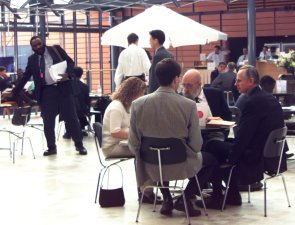
|
The long
hallway leading to
the Documents Center
|

|
|
And
right outside the Palais des Congres . . . .
|
|
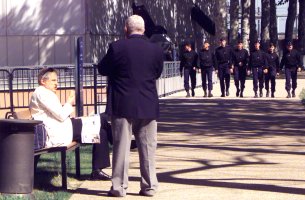
|
Delegates and
the French police enjoy the sunshine
|
|
Right:
The Modern Art Museum is
close by the conference center
|
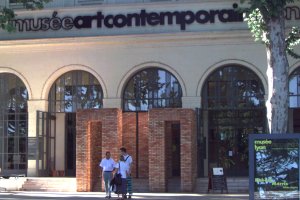
|
In
the corridors...
The week-long informal meetings ended with
a number of participants expressing concern over slow progress on most
issues, given the limited time for COP-6 preparation.
The informal week also witnessed the formation
of a new negotiating group, the "Environmental Integrity Group," which
includes Switzerland, the Republic of Korea and Mexico. The aim of the
group is to ensure that its members can participate in smaller group negotiations
likely to take place during critical eleventh hour talks at COP-6. Observers
are taking a "wait and see" approach regarding the possible impact of
the new grouping.
This news coincided with Vanuatu's announcement
that the LDCs will take group positions on issues such as FCCC Article
4.8 and 4.9 (adverse effects). Some suggest that this reflects the predictable
divergence of interests and priorities among sub-groups within the G-77/China,
readily apparent during the informals.
|



